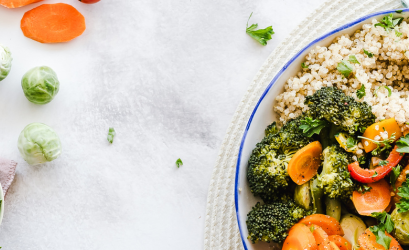Health and nutrition have been relegated to the background in today’s sedentary and fast-paced lifestyle. In this situation, nutrition and dietetics courses after the 10th include topics including fitness, health, and leading a healthy lifestyle in general. A full-time profession in this area is a possibility for those who are interested in it.
Candidates who complete their primary school education might choose to pursue higher study or want to be aspiring nutritionists and dietitians. The curriculum and disciplines in nutrition and dietetics encompass a variety of topics such as food management, food preservation, food service, etc. Continue reading the blog to learn more.
Table of Contents:
- What is Diploma in Dietetics and Nutrition after the 10th
- Highlights
- Nutrition and Dietetics Courses Eligibility
- Diploma in Dietetics and Nutrition Admission
- Admission Process
- Cutoff of Top Colleges
- Diploma in Dietetics and Nutrition Skills Required
- Organisational Skills
- Communication Skills
- Team Work
- Interpersonal Skills
- Time Management Skills
- Interest in Health, Diet, and Fitness
- Diploma in Dietetics and Nutrition Syllabus
- Diploma in Dietetics and Nutrition Fees Structure
- Scope of Diploma in Dietetics and Nutrition
- Career Option After Diploma and Nutrition
- Conclusion
What is Diploma in Dietetics and Nutrition after the 10th
Fitness, health, and a good diet are all connected to the field of nutrition and dietetics. Individuals with an interest in this field of medicine might pursue it as a course of study to launch a lucrative career as a nutritionist or dietician. Both a bachelor’s and a master’s degree are offered in it. After earning one of the two degrees, a person can help others develop a fit and healthy physique and maintain a balanced diet. A dietitian is one of the most sought-after careers after taking a nutrition and dietetics education.
Highlights
Some of the highlights of a diploma in nutrition and dietetics are listed here.
| Particulars | Highlights |
| Degree | Diploma |
| Eligibility | Class 10th and above |
| Academic Session | Semester Based |
| Admission Process | Merit or entrance test |
| Mode of Learning | Full Time and Part-Time |
| Estimated Diploma in Dietetics and Nutrition fee | Rs 50,000 to 1.5 lakhs |
| Career options after the nutrition course | Clinical Dietician, Sports Dietician, Administrative Nutritionist, Food Scientist |
| Top Recruiters | Nestle
Cadbury Unilever GSK Eli Lilly Novartis Food & Nutrition Board (FNB) FNB, Ministry of Women and Child Development |
| Average Salary | Rs 2,33,061 – Rs 4,50,000 |
Nutrition and Dietetics Courses Eligibility
Candidates must meet the minimum eligibility requirements by passing grades X and XII from an authorized educational board with Biology, Physics, and Chemistry as their primary subjects in class XII. Candidates must also have earned at least 50% of the marks in class X. Some schools and universities also accept applicants who major in computer science, botany, biochemistry, or zoology.
Diploma in Dietetics and Nutrition Admission
The results of the candidate’s performance in the Class 10th exams serve as the only criterion for admission to the Diploma in Dietetics and Nutrition program. Admission for the diploma program in dietetics and nutrition often starts in August or September. Both online and offline applications are accepted by students who want to enroll in this program.
Admission Process
- Candidates who wish to apply for the Diploma in Dietetics and Nutrition must visit the institution’s or college’s websites in order to complete the online application.
- On the basis of counseling, government colleges and universities in India choose applicants for admission to diploma programs.
- In order to finish the admissions process, which may include an interview or entrance exam, candidates must next visit the institution or university in person with all necessary documentation, including their Class 10th transcript, certificate, ID evidence, and photographs.
- Candidates who wish to apply offline must acquire an application form from the college and properly complete it before submitting it.
Cutoff of Top Colleges
A set of standards used to assess a student’s academic standing or test performance is known as a cut-off score for the Diploma in Dietetics and Nutrition. Every college has a different cutoff for the Diploma in Dietetics and Nutrition depending on the prerequisite exams and the number of applicants.
Diploma in Dietetics and Nutrition Skills Required
When you are considering pursuing a diploma in Dietetics and Nutrition, it is important to know that the field requires a unique set of skills. Mentioned below are a few skills required to pursue a diploma in Dietetics and Nutrition:
Organisational Skills
One of the talents needed to complete a Diploma in Dietetics and Nutrition is the ability to focus on several activities while efficiently managing one’s time, mental energy, and physical strength. The ability to manage tasks effectively and efficiently is crucial if the applicant or any other person is to provide the results they are hoping for. A company owner might save time and feel less stressed by having good organizational skills.
Communication Skills
One of the crucial abilities for a diploma in dietetics and nutrition or in any other sector is the capacity to communicate ideas effectively and in the same way that one intended. A series of actions known as communication skills are ultimately what constitutes a high-quality public performance. Whether in a candidate’s personal or professional life, communication skills are crucial in practically every area of life. If a person wants to advance professionally, having strong communication skills is crucial. Therefore, the candidate for promotion would not be able to communicate his demands or expectations to the company if he or she lacked this expertise.
Team Work
It is a talent that illustrates how the entire group worked together to complete a certain goal. Most management teams need applicants seeking for a Diploma in Dietetics and Nutrition to have this expertise. The ability to work well in a team encourages love, respect, and loyalty among coworkers, which motivates them to put in more effort and to cooperate and support one another.
Interpersonal Skills
The ability to engage with people and build strong relationships with them is known as interpersonal competence. An individual uses their interpersonal skills to interact and communicate with other people. Empathy, Responsibility, Flexibility, Leadership, Motivation, Dependability, Patience, and Active Listening are a few examples of interpersonal skills.
Time Management Skills
Again, this is a must for becoming a nutritionist or dietitian since professionals in this field must be able to balance work and personal obligations. One of the most crucial components of everything they do is time management since it enables them to complete tasks with assurance, without delay, or under duress. The Company’s leaders will occasionally set deadlines so that it can be finished in a specific period of time. Time management is therefore essential at that time. An individual with effective time management skills may do more in less time, which reduces stress and promotes job success.
Interest in Health, Diet, and Fitness
The most crucial competency that any applicant for a diploma in dietetics and nutrition should possess is this one since, without it, they won’t be able to educate patients or others effectively. Additionally, the candidate would fall short in demonstrating the quality of oneself. The need for dieticians and nutritionists is growing, as is the competition, as individuals are more motivated to stay fit and healthy as a result of greater knowledge of health issues. Therefore, it would be quite challenging for a candidate to maintain if they did not provide patients or other individuals with high-quality nutrition information. This is why a person’s interest in diet and nutrition is crucial.
Diploma in Dietetics and Nutrition Syllabus
An integrated and preventative educational approach to health, nutrition, and illness is used in the Diploma in Dietetics and Nutrition program. The study of food management and learning to enhance one’s quality of life and health is covered in the diploma program in dietetics and nutrition. The Diploma in Dietetics and Nutrition program covers the following topics:
| Food and Nutrition | Human Physiology |
| Computer Fundamentals | Introduction to Food and Nutrition |
| Food Chemistry | Food Preservation |
| Food Microbiology | Communication Skills and Personality Development |
| Public Health and Nutrition | Maternal and Child Health |
| Family Meal Planning | Food Science |
| Food Biotechnology | Nutritional Biochemistry |
| Human Nutrition | Food Quality and Analysis |
| Food Service Management | Ethics and Environmental Studies |
| Industrial Management and Facility Planning | Food Packaging and Marketing Management |
| Basics of Bakery & Confectionary | Diet and Patient Counselling |
Diploma in Dietetics and Nutrition Fees Structure and Details
From college to college, there are differences in the costs for the Diploma in Dietetics and Nutrition program. Comparatively speaking, government colleges and universities charge far less than private ones. Depending on their interests, students can enroll in either a government-run institution or a private one for a Diploma in Dietetics and Nutrition Program. Depending on the college’s ability to provide a variety of services for its students, tuition might range from Rs 50,000 to Rs 1.5 lakhs for two years.
Scope of Diploma in Dietetics and Nutrition
The usage of social media has grown steadily, which has benefited the trends in the dietetics and nutrition industries. Many social media influencers and activists are working to provide information on food, exercise, and health to the large number of users who are active on these platforms. The usage of social media is a fantastic way to educate people about the value of food and nutrition since social media influencers and activists often have first-hand knowledge of these topics without having a formal education. This is especially true as health-related concerns are expanding more quickly.
Career Option After Diploma and Nutrition
Dieticians and nutritionists are in greater demand as health, nutrition, and medical issues become more prevalent. In order for individuals to be healthy and active, dietitians and nutritionists are becoming increasingly important in major cities around the nation. In order for patients, staff, and employees of many hospitals and businesses to be healthy, dietitians and nutritionists are employed by these organizations. Candidate can anticipate employment in the following fields after earning their diploma in dietetics and nutrition:
Dietetics
Dietitians translate nutritional knowledge into useful advice to help consumers choose healthy foods. In order to prevent future problems, they analyze, assess, and treat diet-related problems as well as raise public awareness of the link between food and health.
Food Scientist
A food scientist designs computer programs, examines data, and monitors the food processors. They consider ways to increase animal development, lower animal mortality, and enhance the habitat. Many culinary professionals are developing fresh methods of food preservation and packaging. Research is conducted by certain food scientists to create novel food items.
Conclusion
In conclusion, taking nutritional courses can lead to a successful profession. If you are unable to attend lessons in a traditional classroom environment, there are several online nutrition courses in India, such as the Diploma in Nutrition and Dietetics. It is essential to perform a background check on the institution in terms of reviews, professors, etc. before making your college choice.
If you are someone who is passionate about leading a healthy lifestyle, earning a diploma in food and nutrition after 10th grade may be the ideal career decision for you.
Related Courses

Fashion Design

Fashion Styling

Diploma In Art of Makeup

Diploma in Interior Design





















